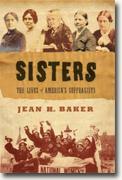Jean H. Baker
book reviews:
· general fiction
· chick lit/romance
· sci-fi/fantasy
· graphic novels
· nonfiction
· audio books
· author interviews
· children's books @
curledupkids.com
· DVD reviews @
curledupdvd.com
newsletter
win books
buy online
links
home
for authors
& publishers
for reviewers

 |
Sisters: The Lives of America's Suffragists Jean H. Baker Hill & Wang Hardcover 288 pages September 2005 |
|
Jean H. Baker is a history teacher and historical writer who has brought together in a comprehensible grouping the leading lights of the original American women’s movement, a movement that began under the banner of universal suffrage. The shadow of that banner extended to include human liberation at its broadest expanse, and tee-totaling at its narrowest point.
The breaker of all molds was Susan B. Anthony, a towering linebacker of a woman who maintained abstemious habits throughout her long life, complaining of ill-fitting dentures as her only health concern. Susan wrote, spoke, traveled, exhorted and championed her cause, keeping others in the movement energized. Though she admired and indeed adored Elizabeth Cady Stanton, she was repulsed by her companion-at-arms’ insistence on having babies, and by her obesity, which Susan regarded as weakness. Cady Stanton, for her part, home-schooled her children and prided herself in bearing her offspring in a few hours’ time between housework and bracing walks in the park. She deplored Christian religion and the clergy who “placed women in a subordinate position, excluded then from participation in the affairs of the church, and developed different moral codes for men than women.” In an initiative that many considered a folly, toward the end of her life Cady Stanton created a Woman’s Bible, revolutionary but unread, to counter the standard version “which teaches that women brought sin and death into the world.” Cady Stanton was naturally suspicious of the young Frances Willard, who frequently quoted the Bible in her fiery temperance speeches and wrote a book demanding the ordination of women as preachers. But Willard’s popularity was overwhelming. She created and led the largest women’s organization of her time, the Woman’s Christian Temperance Union, focusing on sobriety because of the terrible toll that men’s drinking took on women’s lives. Willard was later deified to such an extent that her memory had inevitably to shrink to human size and smaller. She is now regarded as too sentimental for emulation, yet her central purpose in life was to be someone at a time when women were expected to be nobodies. Lucy Stone, a progenitor of the women’s suffrage movement, destroyed its unity of purpose by forming her own splinter group. The blame could not be laid at the feet of her husband, Henry Blackwell, a man who prided himself on his liberal views and encouraged his wife in every aspect of her free-wheeling career. Truthfully, both Blackwell and Stone were so preoccupied – he with his business ventures, mostly failures, and she with the activities of her American Woman Suffrage Association - that neither made much of a marriage, with Henry’s charisma leading him to another woman’s arms while Lucy remained prudishly and probably boringly martyrical about sex. Stone was a born propagandist who held her beliefs passionately but sometimes fell into philosophical error. For example, she insisted that all women should have the vote, but would have denied that same privilege to “wild Irishmen.” And though she wanted only the best outcomes for her sex, she refused to the last to cooperate with the National American Woman Suffrage Association, led by Anthony and Cady Stanton, even to the point of passing up a chance of writing with them the history of the movement as a whole. Each of these imposing women was a giant in her own way. They struggled tirelessly for liberation, traveling and speaking, organizing and arguing. All were unafraid to express their beliefs in writing and from the podium, and were unfazed by criticism, of which they received much, including, as in Lucy’s case, having “sticks and stones and once a hymnal hurled at her back.” As new causes developed, such as the abolition of slavery, women took them up though there was always an underlying zeal for the first cause, that of woman suffrage. Baker’s book ties many threads together, allowing us to see these Amazons in the perspective of their times as well as in relation to one another. One hopes that today’s young women will understand the ground-breaking work they did, against near insurmountable odds, to empower future generations. © 2005 by Barbara Bamberger Scott for curledup.com. |
|
|
|
 Click here to learn more about this month's sponsor! |
|
| fiction · sf/f · comic books · nonfiction · audio newsletter · free book contest · buy books online review index · links · · authors & publishers reviewers |
|
| site by ELBO Computing Resources, Inc. | |
 The women’s movement began at a time when almost no one, male or female, approved of women on the podium. Almost no one seriously countenanced any female wearing anything other than heavy floor-length skirts, and even the fiercest feminists were expected to bear and care for children. It was a time when the dunking stool was still used as a punishment for recalcitrant wives.
The women’s movement began at a time when almost no one, male or female, approved of women on the podium. Almost no one seriously countenanced any female wearing anything other than heavy floor-length skirts, and even the fiercest feminists were expected to bear and care for children. It was a time when the dunking stool was still used as a punishment for recalcitrant wives.